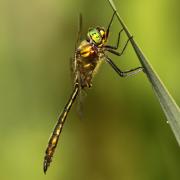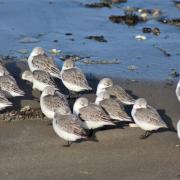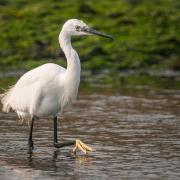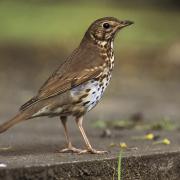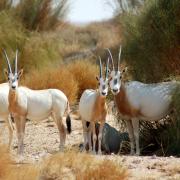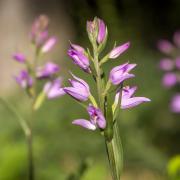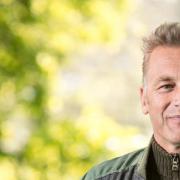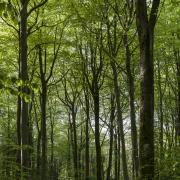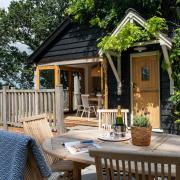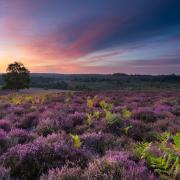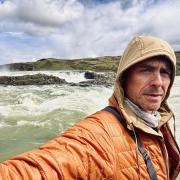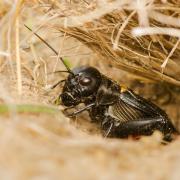Globetrotting wildlife broadcaster and award-winning photographer Chris Packham, chats to Ron Toft about living in the New Forest, growing up in Hampshire and his widely discussed controversial views...
Southampton born and raised Chris became besotted with wildlife at a very early age. Jam jars were filled with “hot, sweaty caterpillars and bugs that didn’t bite too hard!” and lizards, snakes and all manner of pets quickly became a part of his collection along with an obsession with bats and otters. Just before his 12th birthday, Chris found a song thrush’s nest and from then on the classic Observer’s Book of Birds’ Eggs became his bible, enabling him to find and identify all manner of nests and eggs in the hedges and woods near his home.
An education
Chris was educated entirely in Hampshire starting at the infants, junior and secondary modern/comprehensive schools in Bitterne Park, Richard Taunton College in Highfield and at the University of Southampton where he obtained a degree in zoology. Chris reminisces, “Unfortunately a lot of my education was under taken in various pubs and clubs and at The Dell which was the former home of Southampton Football Club. When Southampton won the FA Cup in 1976, it was very fashionable to be a Manchester United fan. As a dedicated rejecter of fashion, I supported The Saints for which I remain very proud. I’ve always liked watching live football and throughout the late ‘80s and ‘90s had a season ticket and went to matches with my dad. He quite enjoyed the lunacy!”
Following his graduation, Chris trained as a wildlife cameraman. His big break came in 1986, not as a cameraman, however, but as a presenter of BBC TV’s award-winning Really Wild Show, aimed at younger viewers. Since then, he hasn’t looked back and has fronted more than 75 series and 500 programmes for the BBC, ITV, Channel 4, Discovery and National Geographic, including Wildshots, Wild Watch, Go Wild, X-Creatures, Postcards from the Wild, Hands on Nature and Nature’s Calendar. He may have travelled the world encountering the wildlife of exotic, far-flung places, but admits that “at the end of the day, I am a bit like ‘home is where the heart is’ in that the thing that concerns me the most and where I think I can personally have the most impact is obviously in my own community.” He says Springwatch and Autumnwatch give people “a real incentive to engage with wildlife first hand. Unless you can get people to meet it, touch and smell it, you can’t get them to love it, and if they don’t love it they won’t help you to protect it when you need them to.”
Watching the wild
Although the technology employed in Springwatch and Autumnwatch enables viewers to get up-close-and-personal with everything from nesting birds to foraging badgers, “the animals themselves are pretty much the same ones viewers might enjoy in their back garden. They’re not rarities,” Chris points out. “A great example is the often-overlooked dunnock or hedge sparrow. Research has shown that what appears to most people to be a seemingly quiet and unassuming species is actually one of the most promiscuous birds around. In fact, the RSPB says dunnocks have riotous sex lives that would make even Russell Brand blush! Dunnocks employ a variety of breeding strategies to ensure their genes are passed on to the next generation. It is by no means unusual, for example, for both sexes to have more than one partner at the same time. I think that people tend to forget that massive romances and great tragedies don’t necessarily have to happen in Hollywood. They also happen in supermarkets around the corner – and in nest boxes in your garden!”
Since replacing veteran Bill Oddie on Springwatch and Autumnwatch in 2009, Chris has forged a close working relationship with fellow presenter Kate Humble and arguably, they are the UK’s most natural wildlife broadcasting duo. Chris, who describes himself as ‘an old punk rocker,’ believes in calling a spade a spade and doesn’t pull any punches on or off screen, he says, “working with Kate I can be as cavalier as I normally am and know full well the programme will be in safe hands!” Which I’m sure is a relief to the rest of the team.
Controversy
Chris’ reputation for speaking his mind and asking difficult, unpalatable questions often ruffles feathers in the corridors of power. For many – if not most, he is a highly articulate champion of the natural world, a naturalist who is able to inspire people from all walks of life, including those who would not regard themselves as nature lovers. To some people, however, Chris is probably a politically incorrect eccentric who shoots from the hip. But as he told me, “I don’t mind making myself sound like a bit of an idiot if it draws attention to issues of major concern. I play devil’s advocate because often no else will.” He is especially outspoken on the subject of global warming, accusing politicians of doing little of any real consequence to prepare the nation for the far-reaching environmental changes expected to take place well before the end of this century.
“What politicians should be thinking about at this critical time is how the infrastructure we have or don’t have should be built or adapted to cope with the expected effects of climate change so that people don’t have their houses full of bloody water every other winter and so that we don’t lose all our coastal wetlands.” Politics, he says, has become “incredibly important from an environmental perspective, because it’s no longer about planting a tree in ‘73 but actually about making radical changes to cope with climate change. We have to approach such a change from a human angle. It’s no good saying that biodiversity comes first. When it comes to the crunch, if your family is hungry you are not going to give two hoots about some bug around the corner, however rare it may be. You’ve got to put people first.” Chris believes there is no longer any doubt that mankind is contributing to climate change.
“I think what might start to trip people up is how quickly the change takes place. Fifty to 100 years from now, we will be living in a very different world.”
Family ties
Chris succeeds at practically everything he does for he is not only an extremely knowledgeable naturalist and TV presenter, but also an author, lecturer, tour leader and award-winning photographer. Last year he received the British Trust for Ornithology’s prestigious Dilys Breeze Medal for his outstanding work in promoting science to new audiences. It was, he said, “a real honour to receive the award from one of the country’s leading scientific research establishments.”
Accomplished ‘snapper’ Chris has also been taking more photographs in recent years and now has his own dedicated image website.
“I’ve been doing these sort of ‘raids’ where I go away for five to 10 days with a very specific, very heavily researched aim – pretty much photographing one species. It means I get a lot more images for my expenses.” Megan, Chris’ teenage stepdaughter, is following in his footsteps, it seems, and is also becoming very adept at wildlife photography. Chris says, “She is into photography big time. Nearly all our trips are photographic. I get very excited about young people’s photography because they don’t understand or care about the rules.”
Home sweet home
Although for most of his life, Chris lived in or near Southampton, some years ago, he bought a large, restored, 12th century property near Bordeaux, France. He explains, “I happened to walk through a piece of countryside in France that hadn’t been impacted by industrial agriculture and, as a consequence, was still full of life. By comparison, the English countryside is at times no more than a desert.” Chris has no immediate neighbours in France finds that, “people are much friendlier because they are subjected to less stress, and they lead a much healthier lifestyle. I don’t think the French are any better than us. It’s just that they live at a lower density. I pretty much moved to France for the countryside.” Despite buying a property in France, Chris has by no means severed his links with his native Hampshire, for he also rents a property in the New Forest where he lives for much of the year with his beloved poodles, Itchy and Scratchy and his girlfriend, Charlotte Corney, who runs the Isle of Wight Zoo. He devotes most of what little spare time he has available to photography, but says he also enjoys visiting art galleries and studying the history of art.
Chris has already seen more animals and plants and visited more places than most people dream of and readily admits, “I’m one of the luckiest blokes on Earth.” With so much wildlife on our doorsteps, why not take inspiration from Chris and get to know your local habitat this summer, you never know what you might find.
For more information about Chris Packham, go to:
www.chrispackham.co.uk; www.chrispackham.co.uk/photography.htm and www.bbc.co.uk/springwatch



